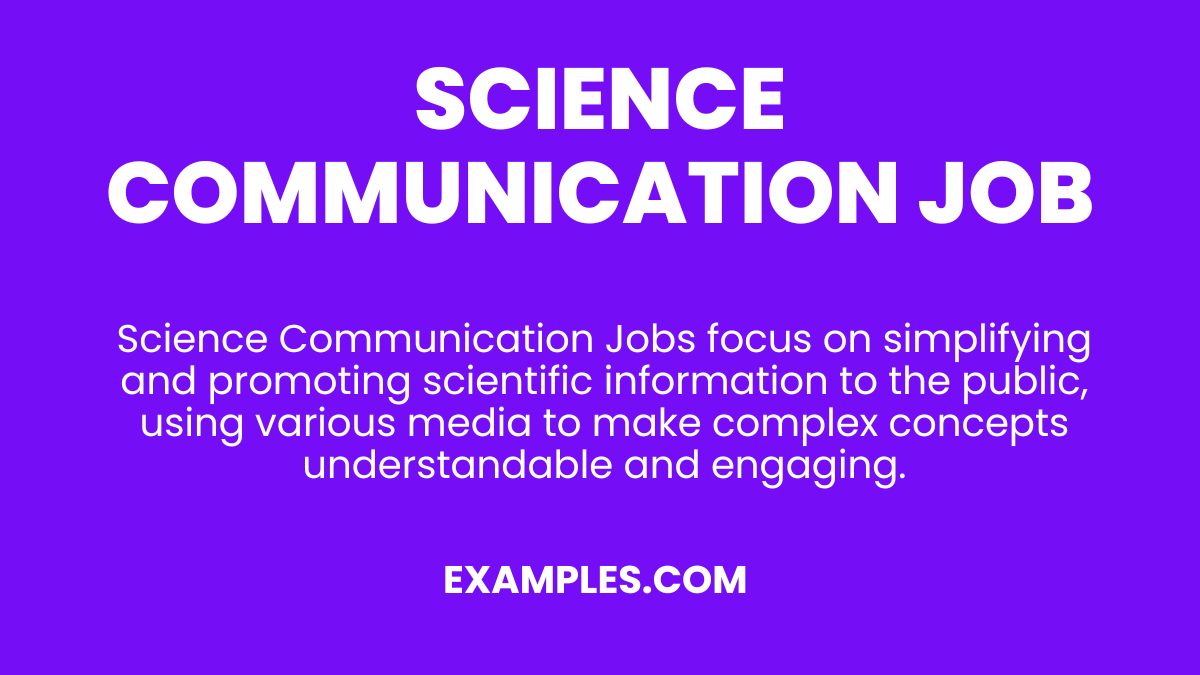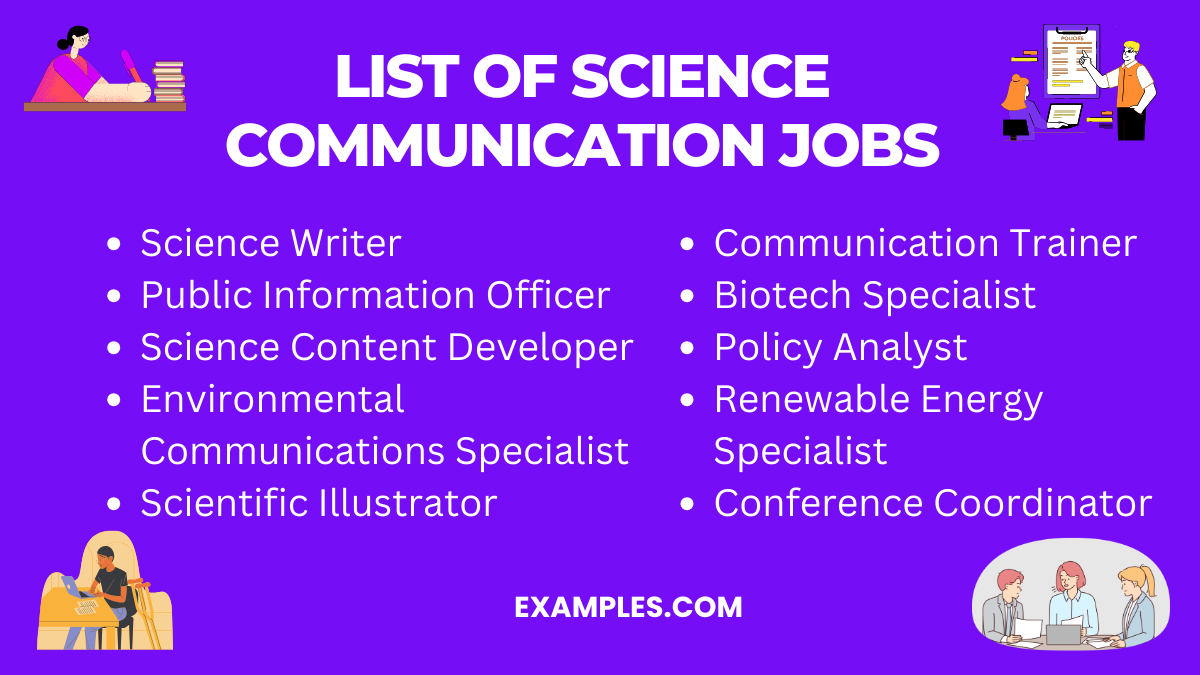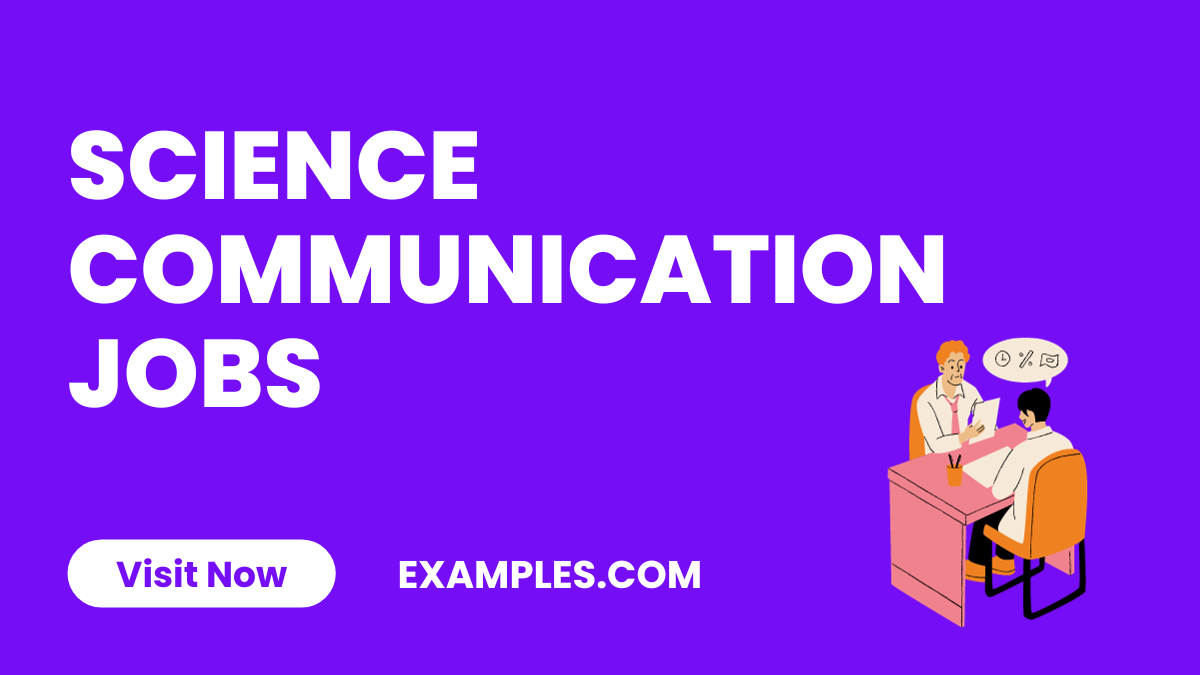9+ Science Communication Jobs Examples
Embark on an enlightening journey through the world of Science Communication Jobs, a field where complex scientific concepts are transformed into accessible information. This comprehensive guide provides insights into various career paths, potential salaries, and the necessary skills required to excel. Through engaging communication examples, we explore how science communicators effectively bridge the gap between scientific communities and the public. From writing articles to creating educational videos, these professionals play a crucial role in demystifying science, promoting public understanding, and fostering a scientifically informed society. This guide is an invaluable resource for aspiring science communicators, offering a window into the dynamic intersection of science and communication
What is Science Communication Job?

Science Communication Jobs involve the practice of explaining, clarifying, and promoting scientific information and ideas to diverse audiences. These roles require translating complex scientific concepts into understandable language, often using various media forms like writing, broadcasting, or digital content. Professionals in this field work to bridge the gap between the scientific community and the public, ensuring accurate and accessible dissemination of scientific knowledge. The goal is to make science engaging and relevant to everyday life, thus enhancing public understanding and appreciation of science and its applications.
List of Science Communication Jobs

Science communication is a dynamic field that plays a crucial role in bridging the gap between the complex world of science and the general public. Professionals in this field use their expertise to make scientific knowledge accessible and engaging to a wider audience. Whether it’s through writing, journalism, education, or multimedia content creation, science communicators help people understand and appreciate the wonders of the scientific world.
1. Science Writer
Job Duties: A Science Writer specializes in translating complex scientific concepts into accessible and engaging content for the general public. Their work involves researching and writing articles, reports, and scripts on scientific topics for various media outlets, including magazines, websites, and educational platforms. They play a crucial role in bridging the gap between the scientific community and the public, making science understandable and interesting. Essential skills include a strong grasp of scientific knowledge, excellent writing ability, and the capacity to effectively communicate intricate ideas in a clear and captivating manner.
Average salary: $65K – $95K
2. Public Information Officer
A Public Information Officer plays a key role in disseminating information to the public, particularly in government or scientific organizations. They are responsible for crafting clear and accurate press releases, managing media relations, and ensuring the public stays informed about relevant developments and initiatives. Their duties often include organizing press conferences, handling public inquiries, and coordinating with various departments for consistent messaging. Strong communication skills, both written and verbal, along with an ability to translate complex information into accessible language, are essential for success in this role.
Average salary: $72K – $120K
3. Science Content Developer
A Science Content Developer specializes in creating educational and engaging scientific materials. Their role involves researching, writing, and producing content such as articles, videos, and interactive media to explain scientific concepts. Target audiences can range from students to the general public. They work closely with scientists and educators to ensure accuracy and clarity. This position demands a deep understanding of scientific topics, creativity in presentation, and the ability to make complex subjects understandable and interesting to a broad audience.
Average salary: $57K – $90K
Apply on : Indeed
4. Environmental Communications Specialist
An Environmental Communications Specialist is responsible for raising public awareness about environmental issues and sustainability practices. They develop and execute communication strategies to engage and educate the public, policymakers, and stakeholders on environmental topics. This role often involves creating informative content, managing social media campaigns, and organizing community outreach programs. Key skills include strong writing and storytelling abilities, a deep understanding of environmental science, and the capacity to translate complex ecological information into accessible and persuasive messages. Their work is crucial in promoting environmental stewardship and influencing positive change.
Average salary: $57K – $88K
Apply on : Indeed
5. Scientific Illustrator
A Scientific Illustrator specializes in creating detailed and accurate visual representations of scientific concepts. This role involves translating complex scientific information into illustrations that enhance understanding and communication in fields like biology, medicine, and environmental science. Using both traditional and digital tools, they produce images for textbooks, research papers, and educational materials. Their work requires a unique combination of artistic talent and scientific knowledge, making it essential for effectively bridging the gap between scientific communities and the general public through visual education and storytelling.
Average salary: $69K – $114K
6. Communication Trainer
A Communication Trainer specializes in enhancing communication skills within an organization. Their role involves designing and delivering training programs that focus on improving verbal, non-verbal, and written communication. They work with individuals and teams to develop effective presentation skills, interpersonal communication, and public speaking abilities. By utilizing interactive workshops, personalized coaching, and practical exercises, they help employees communicate more effectively, both internally and externally. This role is crucial for fostering better workplace collaboration, enhancing professional interactions, and ensuring clear and effective communication across all levels of an organization.
Average salary: $68K – $111K
7. Biotech Specialist
A Biotech Specialist is involved in communicating complex biotechnology concepts and advancements to a broad audience. This role includes creating educational content, managing public relations for biotech firms, and liaising between scientific teams and the public. They play a crucial part in making cutting-edge biotechnological research understandable and accessible, often through articles, presentations, and media engagement. Their work is essential in bridging the gap between scientific innovation and societal understanding, requiring a unique combination of scientific knowledge and effective communication skills.
Average salary: $42K – $68K
Apply on : Indeed
8. Policy Analyst
A Policy Analyst in science communication specializes in analyzing and interpreting scientific policies, translating complex data and research findings into understandable terms for decision-makers and the public. Their work involves evaluating the implications of scientific developments and advising on policy formulation. This role requires a deep understanding of both scientific concepts and legislative processes. They play a crucial part in bridging the gap between science and policy, ensuring informed decision-making and effective communication of science-related policies to stakeholders and the broader community.
Average salary: $74K – $118K
9. Renewable Energy Specialist
A Renewable Energy Specialist focuses on communicating the importance and advancements in renewable energy technologies and sustainability practices. Their role involves educating the public, policymakers, and industry stakeholders about renewable energy sources like solar, wind, and bioenergy. They create informative content, lead awareness campaigns, and engage in community outreach to promote the adoption of sustainable energy solutions. This specialist’s work is vital in driving environmental awareness and influencing public and corporate policies towards a more sustainable and eco-friendly future, requiring a blend of technical knowledge and communication skills.
Average salary: $68K – $115K
10. Conference Coordinator
A Conference Coordinator specializes in organizing and managing scientific conferences and events. This role involves planning logistics, coordinating with speakers and attendees, and ensuring the smooth execution of the event. They are responsible for venue selection, scheduling, managing registrations, and facilitating technical requirements. The Conference Coordinator plays a pivotal role in creating a platform for knowledge exchange and networking among scientific professionals. Effective communication, organizational skills, and attention to detail are crucial for the success of these educational and collaborative scientific gatherings.
Average salary: $48K – $68K
Why is Science Communication Important?
Science communication is crucial for several key reasons, each contributing to the broader understanding and appreciation of science in society:
Enhancing Public Understanding
- Simplifies Complex Concepts: Breaks down scientific jargon for easier comprehension.
- Promotes Scientific Literacy: Increases public knowledge about science.
Influencing Policy and Decision-Making
- Informs Policy Makers: Provides essential scientific insights for informed policy decisions.
- Empowers the Public: Helps people make educated choices on science-related matters.
Inspiring and Educating
- Encourages Scientific Careers: Inspires future generations to pursue science.
- Engages Diverse Audiences: Makes science interesting and accessible to all.
Combating Misinformation
- Corrects False Information: Addresses and corrects scientific misconceptions.
- Builds Trust in Science: Enhances public trust in scientific processes and findings.
Supporting Scientific Advancements
- Facilitates Collaboration: Fosters connections within the scientific community.
- Increases Research Visibility: Helps disseminate scientific discoveries more broadly.
Does Science Communication Pay Well?
Science communication can offer competitive salaries, with pay varying based on role, experience, and location. It’s a rewarding field with diverse job opportunities.
What Skills Do You Need for a Science Communication Job?
Key skills include strong writing and speaking abilities, understanding of scientific concepts, creativity, ability to simplify complex information, and proficiency in digital media.
What is a Science Communication Career?
A science communication career involves creating and delivering content that makes science accessible and engaging to the public, encompassing roles in writing, education, media, and outreach.
In conclusion, Science Communication Jobs play a crucial role in bridging the gap between scientific communities and the public. This article has explored various examples, impacts, and challenges within the field, offering insights into recognizing and addressing communication barriers. By emphasizing the importance of clear, engaging science communication, we underscore its significance in fostering an informed society and encouraging scientific literacy and engagement.



